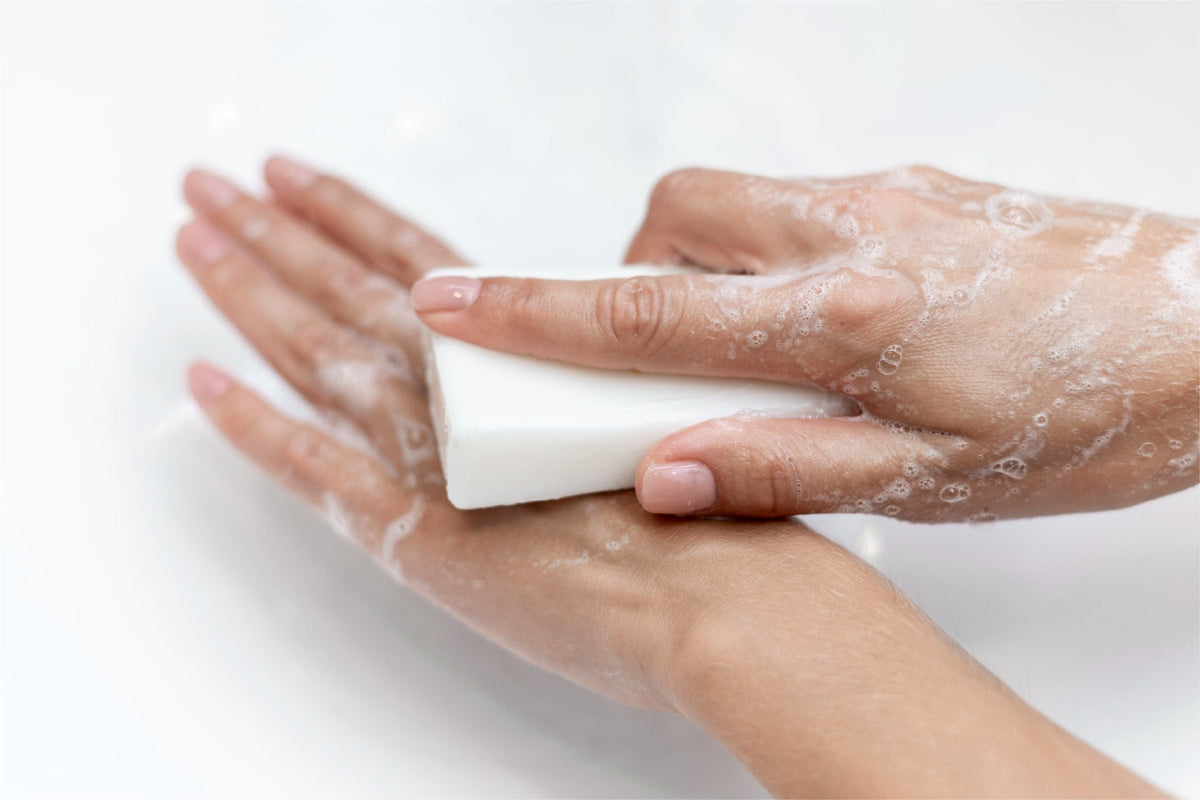
Walk into any store and you’ll see an aisle split in two, which would look like classic bars of soap stacked on one side, rows of bottled body wash on the other. The soap vs body wash debate is as old as liquid cleansers themselves. Some people love the nostalgia and simplicity of a bar, while others swear by the rich lather of a body wash.
This choice isn’t just about preference—it’s about skin health. What you use every day in the bath, touches your skin’s natural barrier, affects hydration, and can even influence how comfortable you feel hours later. Picking the right option matters more than most realize.
What Is Bar Soap?
Bar soap is the traditional cleanser most of us grew up with. It’s made by mixing fats or oils with lye in a process called saponification. The end result is a firm bar that breaks down dirt and oil when it meets water.
Typical ingredients include:
- Base oils or fats like coconut oil, olive oil, or palm oil.
- Alkali (sodium hydroxide) to convert oils into soap.
- Fragrance or essential oils for scent.
- Glycerin or added emollients in higher-quality bars to prevent dryness.
Older styles of soap had a reputation for leaving skin “squeaky clean” but also tight. Newer versions often include nourishing extras, but they still tend to have a higher pH than your skin naturally prefers.
What Is Body Wash?
Body wash is a liquid cleanser stored in bottles or pumps. It’s formulated with water, surfactants, and conditioning agents, usually with extras for skin benefits.
Inside a bottle of body wash, you’ll often find:
- Cleansing surfactants that grab onto oil and dirt.
- Moisturizers such as Glycerin, Ceramides, or plant oils.
- Active ingredients like Salicylic Acid (great for back acne) or Glycolic Acid (for smoother skin).
- Fragrance and preservatives to keep the formula stable.
Because these products are designed to stay closer to skin’s natural pH, they often feel gentler. For example, an exfoliating body wash can clear away dead skin cells, while a Glycolic Acid body wash can brighten dull areas.
Key Differences Between Soap and Body Wash
1. Composition and Ingredients
Soap bars lean toward simple ingredients. But that simplicity comes with a tradeoff: a higher pH, which can disrupt skin’s moisture balance.
Body wash usually has more ingredients, but they’re chosen to be gentler. Hydrating agents and balanced pH make it a safer choice if dryness or irritation is an issue.
Skin Suitability
- Bar Soap: Better for oily or resilient skin. Great if you like that “ultra-clean” feeling.
- Body Wash: More suitable for dry, combination, or sensitive skin. Many formulas are tailored, such as body wash for women with specific hydrating or brightening ingredients.
2. Application and Usage
With bar soap, you rub it directly on your skin or lather it in your hands. It’s quick and effective.
Body wash usually needs a loofah, sponge, or just your hands. It creates more foam and often feels more indulgent.
3. Longevity and Cost-effectiveness
One bar of soap can last weeks if stored correctly. On the other hand, body wash runs out faster because it's liquid and people tend to pour more than they need, which makes it the pricier option as compared to soap.
4. Storage and Hygiene
Here’s where body wash has the upper hand. A sealed bottle is more hygienic than a damp bar sitting in a dish. Bars can breed bacteria if left wet, so they need proper drainage.
Pros and Cons: Soap vs Body Wash
|
Feature |
Bar Soap |
Body Wash |
|
Cost |
Cheaper per use |
Runs out quicker |
|
Moisture |
Can feel drying |
Usually more hydrating |
|
Hygiene |
Needs careful storage |
Clean and sealed in bottles |
|
Travel |
Solid, no leaks |
Bottles can spill |
|
Ingredients |
Minimal, straightforward |
Complex, tailored |
|
Skin Match |
Works for oily/normal skin |
Best for dry, sensitive, or acne-prone skin |
Advantages of Bar Soap
- Lasts longer, more affordable.
- Compact, no liquid mess when traveling.
- Simple ingredients, often with fewer preservatives.
Disadvantages of Bar Soap
- Can feel harsh on dry or sensitive skin.
- Needs a draining dish or it gets slimy.
Advantages of Body Wash
- Often pH-balanced and moisturizing.
- Easy and hygienic to dispense.
- Available in targeted versions, from hydrating to acne-clearing.
Disadvantages of Body Wash
- Packaged in plastic, less eco-friendly.
- May contain fragrances or preservatives that bother sensitive users.
Which Is Better: Bar Soap or Body Wash?
So, which is better: soap or body wash? It depends less on what’s “better overall” and more on what’s better for you.
Factors to Weigh
- Skin Type: Dry skin does better with body wash. Oily skin may feel cleaner with soap.
- Convenience: Body wash is neater, soap is simpler.
- Feel: If you like a big foamy lather, body wash usually delivers more of it.
Cost and Longevity
If budget matters, bar soap nearly always comes out ahead. It lasts longer, and a single bar costs far less than repeated bottles.
Body wash makes sense if you’re willing to trade cost for ease and skin-specific benefits.
Lifestyle Match
- Bar Soap: Suits minimalists, eco-conscious shoppers, or anyone who likes a traditional bathing style.
- Body Wash: It can be perfect if you enjoy a spa-like feel, need a higher level of hydration, or want actives like Salicylic Acid or Glycolic Acid in your skincare routine.
Final Take
When comparing soap vs body wash, there’s no universal winner. If you want affordability and less packaging, soap works. If your skin feels tight after a bar or you want added skincare benefits, body wash makes more sense.
At the end of the day, your skin will tell you which one feels right. Try both, pay attention to how your body responds, and go with the option that leaves you feeling comfortable and confident.
FAQs
Is it better to use body wash instead of bar soap?
For dry or sensitive skin, yes. For oily or tolerant skin, not necessarily. Both can work depending on your needs.
Can I use both soap and body wash?
Of course. Many people keep a bar for quick washes and a body wash for days when they want hydration or actives.
Can I Use body wash on my face?
No. Facial skin is more delicate. Stick with a cleanser designed specifically for your face.
Shop The Story
Gently exfoliates for smoother, acne-free skin
See reviews





